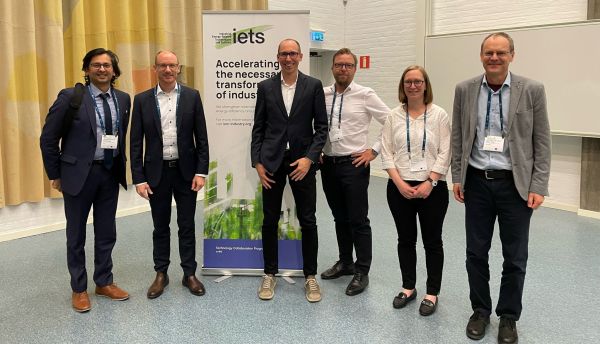IEA IETS Annex 18: Digitalization, artificial intelligence and related technologies for energy efficiency and reduction of GHG emissions in industry (Working period 2020 - 2023)
Short Description
Objectives
The overall objective of the international IEA IETS Annex 18 is to increase the knowledge, development and application of digitalization, AI and related technologies to improve the economic and environmental performance of energy and GHG intensive industries. The goal, innovation content and desired results of Task 2 of Annex 18 is to expand and improve the implementation of digital twins in the industry and to create the necessary foundations and framework conditions for this.
Activities
An overview of the methods and applications of digital twins and their requirements for different industrial sectors along their life cycles shall be given. The potential benefits of these methods will be analyzed and the relevance of DT for reducing emissions and improving energy efficiency will be illustrated. In the course of this, business models and recommendations can be formulated which will serve as a guideline for the successful implementation of DT in industry.
The interdisciplinary consortium of Annex 18 Task 1 offers the opportunity to examine relevant methods and applications of DT from the perspective of research and industry and to generate expertise. In cooperation with the other tasks of Annex 18, an international network and information structure for DT methods and applications can be created. Only with this interdisciplinary and international exchange of knowledge is it possible to cover all aspects of this extensive topic and to establish a sound basis for the increased use of digitalization methods like DT in industry.
Results
The focus of the project was on three main topics: Definitions of the most relevant terms in the are of digital twins, assessment of the state of the art of digital twins in industry and research as well as development of a roadmap for the advancement and implementation of digital twin technologies. For each of these main topics, a publication is available on the website of the BMK. The publications give an overview of the work that was done and summarizes the key insights.
Project Images
Terms of use: The pictures listed underneath the header “Project Pictures” originate from the projects in the frame of the programmes City of Tomorrow, Building of Tomorrow and the IEA Research Cooperation. They may be used credited for non-commercial purposes under the Creative Commons License Attribution-NonCommercial (CC BY-NC).
Publications
Participants
Austria, Canada, Denmark, Finland, France, Germany, Portugal, Netherlands, Italy, Sweden, Switzerland
Contact Address
Project leader
Technische Universität Wien
Institute of Energy Systems and Termodynamics
Univ.-Prof. Dr. René Hofmann
Getreidemarkt 9/E302, 1060 Wien
E-Mail: rene.hofmann@tuwien.ac.at
Tel: +43 1 58801 302327
Project partners
AIT Austrian Institute of Technology GmbH (AIT)
Center for Energy – Sustainable Thermal Energy Systems
DI Sophie Knöttner
Giefinggasse 2, 1210 Wien
E-Mail: Sophie.knoettner@ait.ac.at
Tel: +43 664 88 90 43 37
AEE – Institute for Sustainable Technologies (AEE INTEC)
Jürgen Fluch
Feldgasse 19, 8200 Gleisdorf
E-Mail: j.fluch@aee.at
Tel: +43 (0) 3112 5886 454
Montanuniversität Leoben
Chair of Energy Network Technology
Univ.-Prof. Dr. Thomas Kienberger
Franz-Josef-Str. 18, 8700 Leoben
E-Mail: thomas.kienberger@unileoben.ac.at
Tel: +43 3842 402 5400


